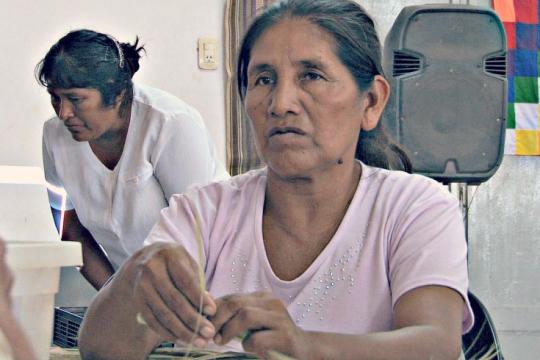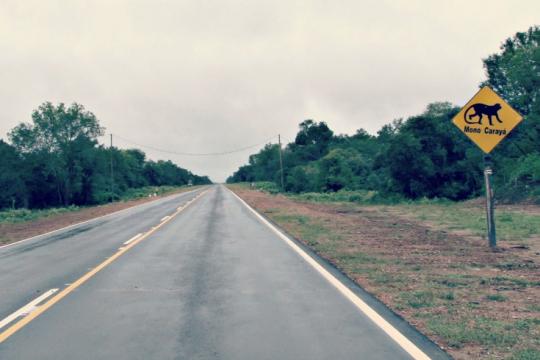Also available in:
Español

If someone asked you what can boost gender equality in rural and indigenous communities in Latin America, a road would probably not be your first answer.
Well, think again!
During a recent trip to northern Argentina, we visited one of the main attractions in the area: the Qom Culture Route (QCR), a corridor of seven cultural centers led by artisan Qom women - 10% of the indigenous population in the country belongs to this ethnic group - spread along the recently paved Route 3 in the province of Chaco, as part of the Ministry of Federal Planning, Infrastructure and Services’ Norte Grande Road Infrastructure Project, with support from The World Bank. The project has helped build these women’s community centers and trained them in entrepreneurial, associative and commercial skills.
Whether you are looking for environmentally sustainable handicrafts or cultural activities, these centers are the “must-see sites” of the route. The pavement of the road created opportunities for Qom women to take the lead in the preservation of their cultural heritage: in particular, they were involved in the production of bilingual Spanish and Indigenous Mother Tongues road signs showing sites of cultural–ethnic interest as well as fauna and flora maps along the route.
Indigenous women have historically been excluded from development opportunities in the north of Argentina. Although they have great strength – women are often the head of their households - they suffer economic and social conditions of disadvantage compared to men.
Qom women do not only face gender barriers, they are also constrained by their ethnicity. A recent multi-country analysis of census data in Latin American and African countries shows that the interaction between being female and belonging to a minority group (like an indigenous community) has a compounding effect on educational attainment.
Argentina is no stranger to this: illiteracy among the indigenous population stands at 3.8% compared to 1.9% of the rest of the population.
And the ethnic gap does not only affect education: indigenous groups have much more limited access to health services, which impairs their welfare and limits their ability to rise out of poverty. Studies reveal that 47.4% of indigenous people in the country do not have access to health insurance.
That is why the benefits of the QCR are so significant. A recent study conducted among women participating in the initiative has revealed the impact of the route in their agency, i.e. their capacity to make meaningful decisions and plans for their lives. According to the main findings of the study, the project has benefited the following aspects of Qom women’s lives:
The route is now proof of what is going on in the region: as reflected in the World Bank’s Gender at Work study, extreme poverty in Latin America would have been 30% higher if it wasn’t for the increase in women’s income.
Even husbands in the QCR acknowledge the benefits of the project: “When I don’t have a job, the money my wife makes by selling handicrafts on the route is very important for our family”, says Mario David Ruiz, from Fortín Lavalle.
So, gender equality is not only essential from an ethical point of view, it is also beneficial from an economic perspective, and can yield broad development dividends.
With support from Fundacion Gran Chaco, Qom women have managed to expand into new markets with their amazing handicrafts: from Buenos Aires’ most important fairs to exhibits and events in London and New York.
In fact, Aureliana Gonzalez, one of the wisest of the group managing the QCR went to a gourmet slow food fair in Turin, Italy this October to promote the use of carob, one of the secret ingredients of Qom cooking.
Also, the technological company Samsung is donating equipment for the cultural centers that will allow these indigenous women to move faster in the commercialization and promotion of this route, now an unparalleled combination of green landscape and indigenous cultural heritage.
Paving the road has not only brought economic relief to Qom women, it has brought them much closer and made them stronger.
And Qom women in Argentina are not the only ones benefiting from infrastructure projects across the region. This study is part of an ongoing impact evaluation including World Bank projects in Nicaragua and Peru on gender mainstreaming in transport projects. We will tell you more about the findings of this study soon.
This work is being conducted with support from the Umbrella Facility for Gender Equality .


If someone asked you what can boost gender equality in rural and indigenous communities in Latin America, a road would probably not be your first answer.
Well, think again!
During a recent trip to northern Argentina, we visited one of the main attractions in the area: the Qom Culture Route (QCR), a corridor of seven cultural centers led by artisan Qom women - 10% of the indigenous population in the country belongs to this ethnic group - spread along the recently paved Route 3 in the province of Chaco, as part of the Ministry of Federal Planning, Infrastructure and Services’ Norte Grande Road Infrastructure Project, with support from The World Bank. The project has helped build these women’s community centers and trained them in entrepreneurial, associative and commercial skills.
Whether you are looking for environmentally sustainable handicrafts or cultural activities, these centers are the “must-see sites” of the route. The pavement of the road created opportunities for Qom women to take the lead in the preservation of their cultural heritage: in particular, they were involved in the production of bilingual Spanish and Indigenous Mother Tongues road signs showing sites of cultural–ethnic interest as well as fauna and flora maps along the route.
Indigenous women have historically been excluded from development opportunities in the north of Argentina. Although they have great strength – women are often the head of their households - they suffer economic and social conditions of disadvantage compared to men.
Qom women do not only face gender barriers, they are also constrained by their ethnicity. A recent multi-country analysis of census data in Latin American and African countries shows that the interaction between being female and belonging to a minority group (like an indigenous community) has a compounding effect on educational attainment.
Argentina is no stranger to this: illiteracy among the indigenous population stands at 3.8% compared to 1.9% of the rest of the population.
And the ethnic gap does not only affect education: indigenous groups have much more limited access to health services, which impairs their welfare and limits their ability to rise out of poverty. Studies reveal that 47.4% of indigenous people in the country do not have access to health insurance.
That is why the benefits of the QCR are so significant. A recent study conducted among women participating in the initiative has revealed the impact of the route in their agency, i.e. their capacity to make meaningful decisions and plans for their lives. According to the main findings of the study, the project has benefited the following aspects of Qom women’s lives:
- Better economic opportunities and career perspectives: There has been a positive impact in the amount of money earned by those women, who now have bank accounts and manage rotating funds. “I was really excited because the road has increased the value of our handicrafts" says Ibel Diarte. Also, there has been an indirect impact: many of them were encouraged to finish school and attend tertiary education training courses.
- Stronger female ties: The interviews in the study show that the road has not only strengthened relationships within their own groups but has also created strong ties with women in nearby communities. “I like it because we have the opportunity to visit other places and other people and we can show them our experience”, says Juana Silvestre from Pampa del Indio, one of the three centers analyzed in the report.
- Education: Women’s increasing participation in associations in recent years is leading to enhanced educational attainment. In this particular initiative, indigenous women are also strengthening their social skills to deal with tourists or other people from “outside” their communities. “I am learning to speak Spanish. I never used to talk to white people or sit at a white people’s table”, says Graciela Arenales.
- Self-esteem: Due to their progress, women in the interviews revealed they feel empowered, happier, prouder and stronger. “I feel more independent, I value myself more because I love what I do and I love the fact that I know how to do it”, explains Andrea Chico, from El Espinillo.
- Political participation: Women involved in the QCR are participating more actively in political activities within their communities, for example by contributing to the development of intercultural and bilingual educational policies, as well as policies related to health services in their communities.
The route is now proof of what is going on in the region: as reflected in the World Bank’s Gender at Work study, extreme poverty in Latin America would have been 30% higher if it wasn’t for the increase in women’s income.
Even husbands in the QCR acknowledge the benefits of the project: “When I don’t have a job, the money my wife makes by selling handicrafts on the route is very important for our family”, says Mario David Ruiz, from Fortín Lavalle.
So, gender equality is not only essential from an ethical point of view, it is also beneficial from an economic perspective, and can yield broad development dividends.
With support from Fundacion Gran Chaco, Qom women have managed to expand into new markets with their amazing handicrafts: from Buenos Aires’ most important fairs to exhibits and events in London and New York.
In fact, Aureliana Gonzalez, one of the wisest of the group managing the QCR went to a gourmet slow food fair in Turin, Italy this October to promote the use of carob, one of the secret ingredients of Qom cooking.
Also, the technological company Samsung is donating equipment for the cultural centers that will allow these indigenous women to move faster in the commercialization and promotion of this route, now an unparalleled combination of green landscape and indigenous cultural heritage.
Paving the road has not only brought economic relief to Qom women, it has brought them much closer and made them stronger.
And Qom women in Argentina are not the only ones benefiting from infrastructure projects across the region. This study is part of an ongoing impact evaluation including World Bank projects in Nicaragua and Peru on gender mainstreaming in transport projects. We will tell you more about the findings of this study soon.
This work is being conducted with support from the Umbrella Facility for Gender Equality .



Join the Conversation